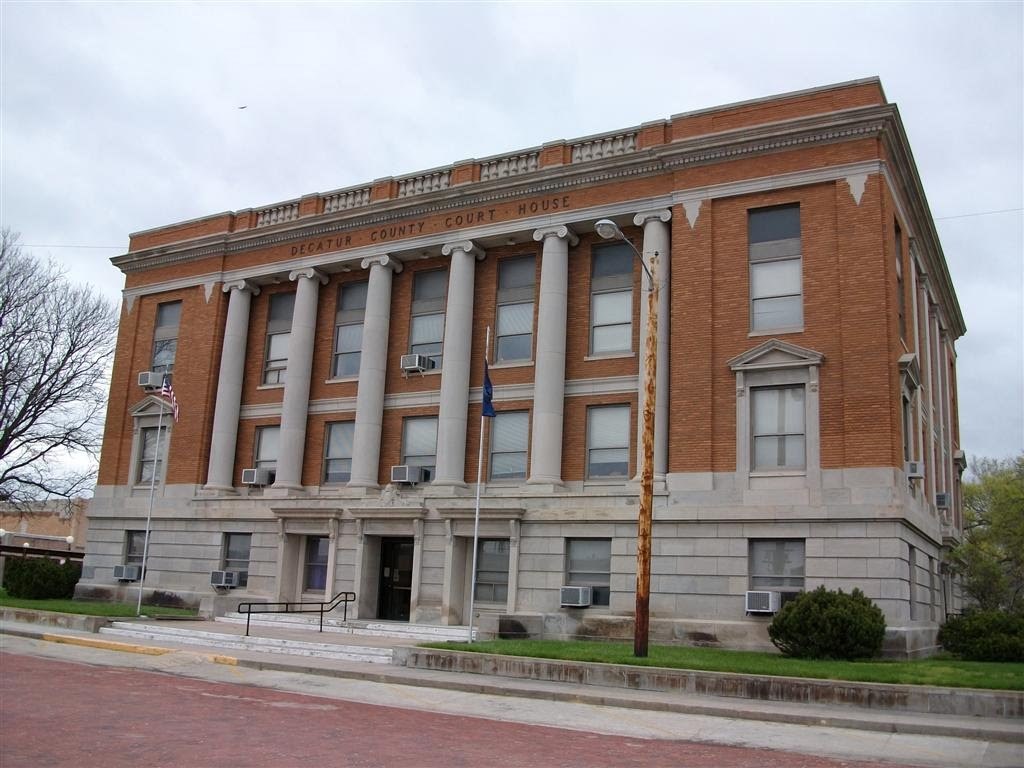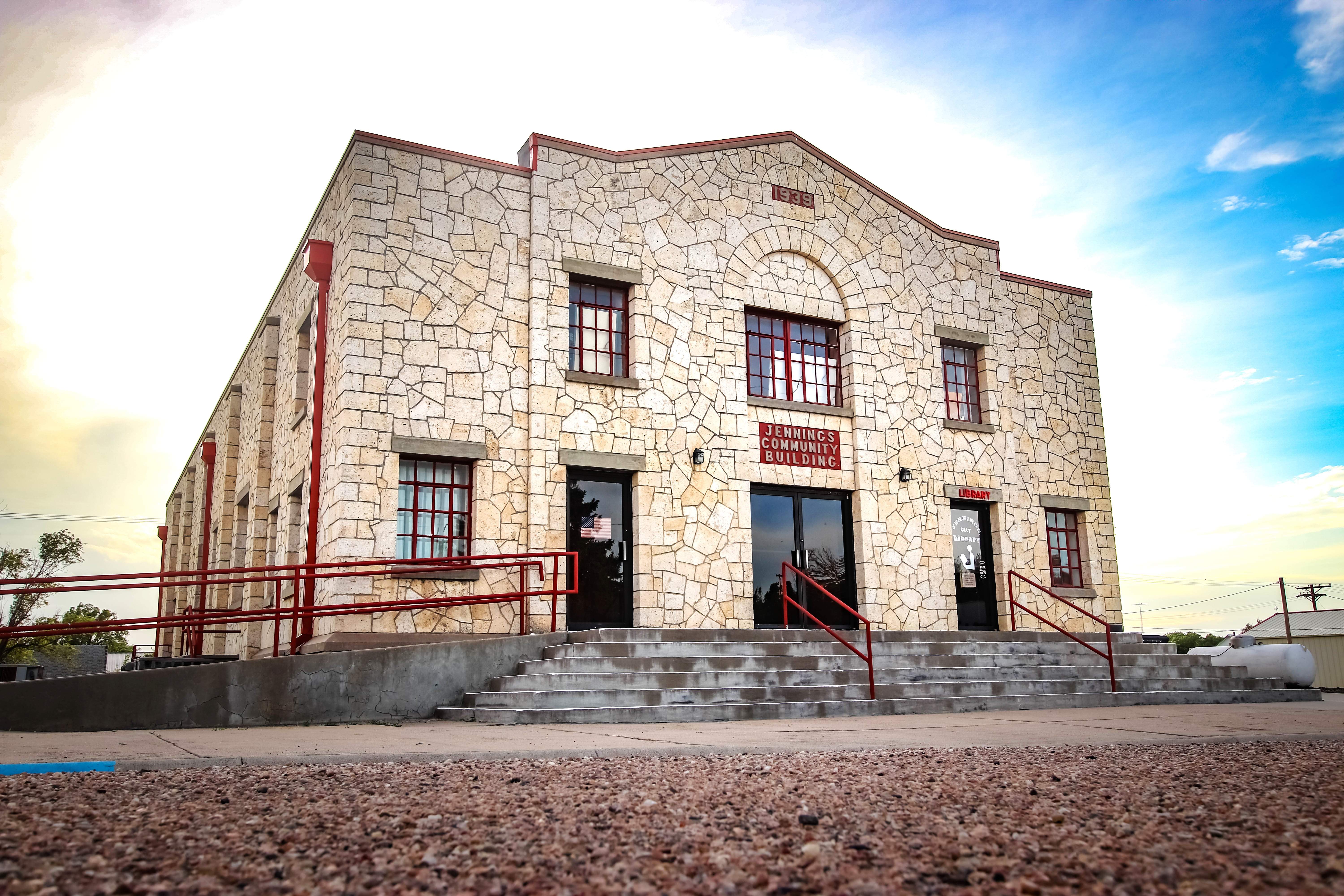City Office
Council Members
Eric Fleckenstein, Councilmember
Paul Nauer, Councilmember
Stann Hartzog, Councilmember
Aaron Cressler, Councilmember
Jennings City
According to the late Mrs. C.E. Feely, settlers came to a place called Slab City in the 1870′s (land now owned by Elmer Tacha), near what is now the town of Jennings. The Valleys of Prairie Dog Creek and the north fork of the Solomon River drew settlers in the area that became South Decatur County.
The Warren Jennings family came to the area from Iowa in 1873 and homesteaded on the Prairie Dog stream nearly a mile Northeast of the site of Jennings. They built a two story frame house from lumber hauled with team and wagon from Ft. Kearney, Nebraska and established the Slab City trading post, which included a Post Office. The Slab City Post Office was established October 22, 1874. Walter W. Hopkins was appointed postmaster. On October 15, 1879, this office was changed to Jennings and remains in operation today. The Slab City trading post patronized by buffalo hunters. potential settlers and at times friendly Indians, according to the Jennings history, published in June 15. 1939 edition of the Oberlin Herald.
The Railroad was completed thru Jennings May 16, 1888. The first depot was a two story building located on the site of the present one. The agent lived in the second story of the building. It burned in 1903 and the present depot was erected. Items from the files of The Jennings Echo April 17, 1903, stated that the Rock Island put on a new cream train between Goodland and Belleville. Sept. 10, 1909 a group of people were in the cab of the engine when the train pulled out without warning and carried them to Dresden before letting them out.
It was in 1879 that O. E.. Munson family came to the area. Munson homesteaded the land on which the town of Jennings was settled. In 1888 the main line of the Rock Island Railroad cut across the Southeast corner of the County. The townsite of Jennings was laid out, and was named for Warren Jennings. Many houses were moved to Jennings from Allison, said Mrs. Feely and many of the people of Slab City moved to Jennings.
History of Decatur County by S. J. Harvey contains this account of the Jennings family’s arrival on the Prairie Dog were: Warren Jennings, Red Cloud, lowa 1874 accompanied by John Green family. They settled near where Jennings now is.
April 17 , 1873, there came to Big Timber a tributary of the Prairie Dog, a small colony of Czechs from Nebr. Besides the Rohans, Steffens and Cileks, she lists Wm. Heilman, Wenzel Skalok, Joseph Wenzel, Jacob Joseph, Wenzel Anton, Frank Louis and Joe Blecha as settlers.
The city of Jennings was laid out in 1888 and was designated an Incorporated town in 1906, with a Mayor-Council type Government. The towns first mayor was W.E. Winget, first councilmen were: M.F. Feely, C.E. Potts, W.P. Noone, A.A. Smith and Bud Harris.
In 1916, Jennings operated a light plant of its own. In 1918 the plant burned, making it necessary for the town to get power from a new source. The City voted Bonds for $20,000 to be used to construct a 10 mile transmission line. In 1928 the Central Kansas Power Co. purchased the line,
In 1936 and 1937 the City Council voted a total of $17,000 in bonds for the construction of the city hall. WPA Workers began construction in 1938 under the supervision of Joseph S. Flaska This project was completed in 1939. The North East section of the City Hall houses the Jennings City Library”
A revival of emphasis on the Czech Heritage of Jennings was effected in 1965, with the beginning of an annual Kolache Festival. Women of the community baked and sold as many as 15,000 kolaches at the annual after harvest festival. Colorful Beseda Dancers performed in the streets. Some of the days festivities were the parade, many different booths, museum, the main attraction being a Czech dinner. In 1969 some 1500 persons were served dinner in the City Hall. At its peak, the festival drew 5,000 people. Funds earned at the festival were used for the community improvements. In 1971, the festival was discontinued because it had outgrown the towns facilities, work force and law enforcement.
Excerpts taken/adapted from Decatur County-Kansas history book
Decatur County Kansas history booksAvailable for purchase in the County Clerk's Office.
$30.00 each, payable by check or cash
Decatur County Kansas history books
$30.00 each, payable by check or cash




